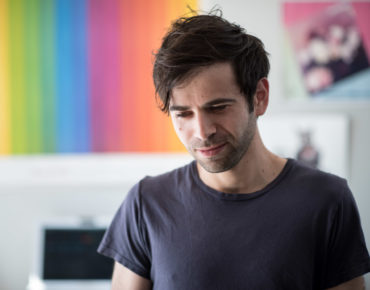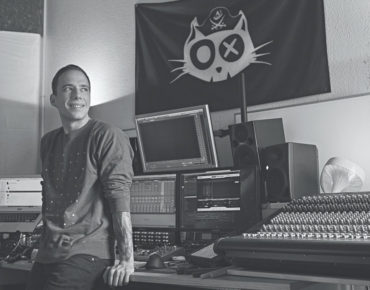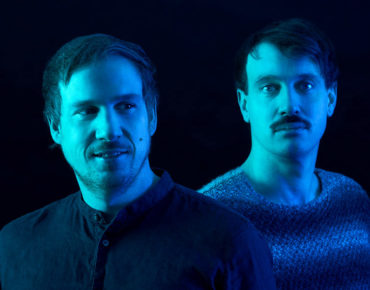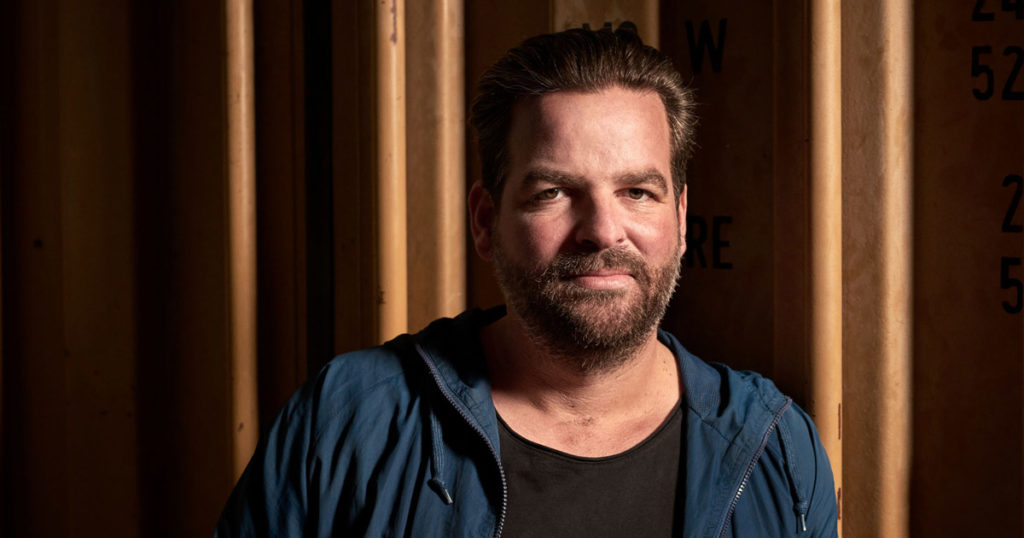
I spoke with Nico Stojan at my small house in Venice, we sat in my living room and ate carrot pieces and hummus with Heidi Edwards a photographer from Los Angeles who took these photos of Nico.
The following is from our conversation that night.
For the full experience, please press play on Nico’s set from Symbiosis while you read.
Click on the button to load the content from SoundCloud.
WITNESS THIS: I am curious about this idea of telling a story in a set. In a recent interview with LA DJ/Producer Hoj, he told me that he pictured a little character going through different scenes. So for example, the character travels underground as the set gets deeper. How do you tell a story with your sets?
Nico Stojan: You have certain tracks and every track has a different emotion and energy. Some tracks are more feminine and some are more masculine and a lot of tracks have both elements and I think it’s about how to put those frequencies together to create a long nice flow. I don’t like the idea of telling a story, it’s more to give the frequencies a certain space to let them flow and create a nice vibe. Sometimes I like to be shocking and play a track that has nothing to with the track before and then it’s kind of a wake-up and then if that was a story then maybe the mannequin falls down or gets blown up by a rocket. (laughing)
“The best set is when you always know what comes next but without making a plan before.”
How can you tell where the set should go?
The best thing to do is not to think about it and just to feel the vibe of the people. It’s similar to when I produce a track and the energy just goes through me. I’m not really thinking about it, it just happens.
Is there something specific you look for when playing a set? How do you not panic if people are not dancing and stop yourself from just throwing dance tracks on? Are there certain reactions from the crowd that are clues to what you should play?
You should always trust your feeling and play a good set for yourself. If this happens and you can enjoy yourself with your music then it swaps over to the crowd automatically. You can obviously play tracks that are hits and super dancy, but I try not to do this in the first place and instead play tracks that I am really enjoying because if I’m not enjoying myself, no one else can be enjoying my set. I’m the first one who has to be excited about what I’m doing. I often have sets where in the beginning I’m like “where is this going”, and I’m not really feeling what I’m doing now and then I drop one track and then it starts. I needed that track to feel what I’m doing and to be inspired.
“It should always be what you play for yourself because if you don’t play for yourself then the people can’t feel it.”
So in those cases where the set feels lost a bit what do you do?
Maybe you have a track from a friend or something you just edited or something you recently produced or that you haven’t played in four years, then that can help it start most of the time.
Do you have something to prepare for a set, some sort of ritual?
I come from a time of playing records, so obviously you had a case or two that you brought to the gig and that was it, so let’s say you had sixty per case, around one hundred records with you and sometimes less and you could only play what you had. In Serato you can make little crates and I pull old stuff and some new stuff and if I have more time like a train ride to the gig then I can pick the ones I feel and maybe I know the club already so I can really play the ones I want to play for the night.
Is there something you do before you play?
Like a ceremony?
Yeah or exercises?
I try not to arrive too late to the gig, it’s like if you jump into the swimming pool and you just arrived, it can be a little bit weird. You have to dip in a little bit, and I like to watch the person before me and check out how the people react to different music.
I also like to be able to have a few drinks when I play, not that I’m super drunk all the time. I like to be a little bit in the mood of the people because people drink a lot at parties and if I come sober it’s really hard to adjust. I like to have a drink or two to really be in the vibe of the crowd.
In the last five years, I only had one set where I drank too much and I played the same song three times because I was so pissed and that was kind of an awful set I think. (laughing) The people said, “Nico that set was a little bit weird what you did there.”
What do you think makes a good opening DJ?
For me, a good support DJ is someone who knows who is playing after him. If someone is interested in doing a good job for the main act then you should be able to give them a nice entrè. When he or she is the main dish, you have to give them good starters. You can do it in different ways, but you should definitely not play a 122-124 tech house set before Powel which makes no sense. I think it’s really nice to play on a lower volume, not super low but to give a little bit of space for the artist after you. Let’s say that you want to say hello to the people coming in and you don’t want to give them a slap in the face.
“I like to look at this [opening] like saying ‘hello come in and have a look around and don’t feel too rushed to dance or do anything’.”
One of my favorite tracks of all time is After the Hour (My first time meeting Nico consisted of me telling him for 10 minutes about how much this track impacted me when I first heard it on a post-break up run through the rain along the river in Mitte, Berlin). I’d love to know about your creative process when you made that track.
Click on the button to load the content from SoundCloud.
It’s actually a very simple answer. My friend had the sample and he could not make anything out of it. He sent it to me, and I was sitting down one night and it was very slow, it’s from this band called Dominique. I warped it in Logic and made it really fast, I think it was 80 bpm and I made it 120, I time-stretched it and then added the bass and drums and cut the best parts of it together, and it took me a few hours and then it was finished.
That’s crazy that you made that track that affected me so much in such a short amount of time!
It’s really one of the tracks where I did almost nothing, I just put it together in a different way. Sometimes the simple things are the best. Now I would do it a little bit different but I can still listen to it. It’s very simple in the way it was produced, I would probably spend a little bit more effort on it now.

How do you sort your music?
I give my tracks certain key names, so let’s say I get a bunch of new tracks and there are a few I really really like I take them and make comments. For example, I write “slow” “grooving”, slow is a word that is under 100. Let’s say I have 15 or 20 words “funky”, “trippy”, “melancholic”, it’s the emotion that the track puts up in me. I have folders for every week, 52 weeks, and I put new tracks in the folders. In Serato, you can see all of the tracks that have that word. When you first hear the track and you get a first impression you give it 4-6 words to describe it.
WT: How do you keep yourself from getting lost in this whole world and going off the deep end when it comes to travel, drugs, girls and that whole world?
I think it’s good to have some breaks. In February or March I go for 2-3 weeks to New Zealand and only play one or two gigs there and the rest of the time I’m just enjoying the nature. Some people need a long break, but for me when I’m at home in Berlin sometimes I just switch off my phone for a week sometimes and don’t answer emails. I don’t let myself get stressed out by this kind of shit. I just focus on doing the main stuff and all of the really important things.
Have you had any times when you’ve really gone off the deep end?
Yes, but this was not because of DJ’ing, it was because of a breakup and my ego got hurt.
What did that do for your music?
I think it was good, actually, I think it was really good! Because then I had to start from scratch, and it was after my last album was finished, and I was falling into the big hole and everything really made no sense anymore. Working three years on an album, and then the girl broke up with me but then it took a half a year and then things were better than before.
It’s good to go through because life is not always going up. I realized that it’s really important to go with the flow. If you imagine that you are a drop in the ocean, the wave is not always going up and it can take you and it’s good because otherwise, you can’t really appreciate how good life is.
What’s the work that you’ve done to get to this stage where you can talk like this? Where does this way of thinking come from?
I started early listening to certain people like Jidda Krishnamurti, he’s a great philosopher and poet. But there are so many people that are saying similar things, you just need to find the person who says it in the words you understand the best, basically that we are all one and the only separation is in our minds. When you are a child you grow up and you realize you have a name, and this is mine and this is yours, and then the separation starts but in the end we all go back to where we came from which is the consciousness.
This is with producing a track or writing a book or making a painting or having a gig or singing—creativity is nothing more than being open to the main consciousness, it’s always there. There is nothing I can create new. There are no keys that haven’t been played before there is no key pattern that the Beatles could play that would be new because you have classical music, jazz music so there is nothing that is new you are just channeling it in a different way.
I love this idea! I heard a TED talk a while back by Elizabeth Gilbert where she spoke about Maya Angelou and how she thought of creativity as literally being the wind that would blow in through the window, and if she wasn’t prepared to catch it, it would sometimes blow through and be gone.
Yes, sometimes you can’t even explain how you create something!
“People ask me how did you do this and I tell them I don’t really know and it’s not really mine it’s just something I channeled in the moment.”
Some people are really open and are able to be channeled the whole time but I’m not creative all the time, for me, it’s almost impossible to be creative all of the time because that means you have to be open all of the time and that is exhausting. There are artist’s who are still not able to handle their life because of being so open and that means that they are very very emotional. Artists like the 27 club they all killed themselves. They all died and they were geniuses, artists like Jim Morrison, Jimi Hendrix, Kurt Cobain.
What do you do when you are in a place where you aren’t feeling creative, is there anything you can do to get yourself in that place?
You can’t just push a button and say “I’m creative now”, but sometimes it can help to just go to the studio and either smoke a joint or drink a bottle of wine. That sometimes turns your head off and you are more open and can go with the flow. After I finished the album I was exhausted and didn’t have any space for being open anymore and I think if you are mentally and physically exhausted, you can’t really be creative or open for being the channel.
What’s your process for making a song?
Well, let’s say I wanted to start my next album. What I’m doing right now is collecting samples, because I come from hip-hop, and I love jazz and soul and funk but I also love synthesizers and for me, the ideal track is a combination of different vibes. A nice sample can be a really great start for a track. Also, you can play a bass line with a guitar or a keyboard or a synthesizer and you start with the melody or something that is bringing you to another stage.
I have a folder of samples of old records and old songs or I go to record shops. I have a folder that a friend gave to me that he has been collecting French and Italian soundtrack music from the last 40 years that he has been digitalizing. I will listen to 100 tracks and I pick the best samples and make a note and put them into a folder and then I take my equipment and book a place, maybe in the mountains or in the forest, in the spring time, maybe Sweden? Then I take the samples and a synthesizer or two and just play with it. Samples always help me to go somewhere and create something around it.

What was it like being in Berlin back in the days of Bar 25 and before Berlin has become so popular?
I was listening to electronic music at 14 or 15 a few years after the wall fell down, let’s say ’93, ’94, I was going to Tresor. It was crazy because it was something so new. People from all around the world were coming and there were no rules, you didn’t have to have a liquor license or something. There was no 10-2 you could go home whenever you wanted to and they didn’t have to close the doors.
Okay, a few quick questions to finish up! What has been the longest set you’ve played?
I think it was at Bar25 and it was a 9 1/2 to 10-hour set? But that’s not even that long compared to some people, I know people that have played a 27-30 hour set.
What can we expect from you moving forward?
This year Acid Pauli and I started a label, we maybe want to bring this to a different stage we don’t want to do only label showcasing but we want to do label gatherings where we want to create something special and we can invite our favorite artists. The label is called Ouïe.
I am excited to release my next album and I have a release with Jaw from dOP on Kindisch and a few other remixes. I think also what is very important for me is to bring the label to another level. We have Acid Pauli’s album coming in March and Oceanvs Orientalis is coming on our label and then Martin (Acid Pauli’s) remix album the end of the year with a lot of nice artist on it. The only thing that can make it better is that we can bring the label to a stage where it’s just there and you don’t need to push it and people just know it and they love the music.
“For me it’s not about the money, it’s about the feeling and that you love what you do and can have a good life with it.”
Follow Nico on Soundcloud, Facebook
Follow Ouïe on Bandcamp







